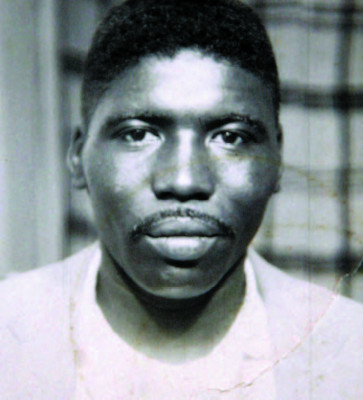 Jimmie Lee Jackson was born on December 16, 1938, in Marion, Alabama. At the young age of 26, Jackson was killed by an Alabama state trooper while peacefully participating in a protest march. His death was the catalyst for the “Bloody Sunday” Selma to Montgomery voting rights march, which eventually led to the 1965 Voting Rights Act. At his funeral, Martin Luther King, Jr. said that Jackson had been “murdered by the brutality of every sheriff who practices lawlessness in the name of law.”
Jimmie Lee Jackson was born on December 16, 1938, in Marion, Alabama. At the young age of 26, Jackson was killed by an Alabama state trooper while peacefully participating in a protest march. His death was the catalyst for the “Bloody Sunday” Selma to Montgomery voting rights march, which eventually led to the 1965 Voting Rights Act. At his funeral, Martin Luther King, Jr. said that Jackson had been “murdered by the brutality of every sheriff who practices lawlessness in the name of law.”
Jackson was a farmer and woodcutter who lived in poverty with his sister, mother, and grandfather in a house with no running water. He joined the Civil Rights Movement in Marion, Alabama after returning from serving his country and fighting in the Vietnam War. In the few years following his return to Marion, several life-changing events would lead to Jackson’s eventual date with his destiny. He became the youngest deacon in the history of Marion’s St. James Baptist Church, fathered a daughter, led voter registration drives, participated in protest marches, and attempted to register to vote on numerous occasions.
On the night of Thursday, February 18, 1965, Jimmy Lee Jackson became a martyr in the Civil Rights Movement when he joined a group of African Americans protesting the jailing of James Orange, a local Southern Christian Leadership Conference (SCLC) official.
That night, the town’s streetlights were turned off; under the cover of darkness, police and state troopers attacked the protesters with clubs, sending them fleeing in all directions.
Jackson and other demonstrators fled to Mack’s Café. Inside the café, Jackson came to the defense of his mother, Viola, and his 82 year-old grandfather, Cager Lee Jackson, who were being beaten by law enforcement officers. Jackson was shot in the stomach by James Bonard Fowler, a state trooper. He was taken to Perry County Hospital and later transferred to Good Samaritan Hospital in Selma. On February 26, 1965, after eight days of excruciating pain and suffering, Jackson died.
Jackson’s death was eulogized by Martin Luther King, Jr., who admonished President Lyndon Johnson over the wanton, and evidently legally sanctioned, police brutality. Minister James Bevel of SCLC and other movement leaders called for a march to Montgomery to protest Jackson’s death and advocate for voting rights.
The March 7, 1965 protest march for Jackson ended abruptly when law enforcement officers attacked the marchers at the Edmund Pettus Bridge. This event became known as “Bloody Sunday” and eventually prompted federal lawmakers to pass the 1965 Voting Rights Act. This act struck down state and local laws that restricted African Americans’ right to vote in Alabama and across the nation. After the act was passed, Jimmie Lee Jackson’s grandfather Cager Lee, who had marched with him in February 1965 in Marion, voted for the first time at the age of 84.
At the time of the shooting, James Fowler was never questioned and received no punishment or disciplinary action, and he remained an Alabama State Trooper. Forty-two years later, in 2007, Fowler was arrested for the murder of Jimmie Lee Jackson and accepted a plea bargain for misdemeanor manslaughter. In 2010, he was sentenced to six months in jail, making him the first law enforcement officer to serve time for a civil rights slaying.
Resources
- Jimmie Lee Jackson. (2015). The Biography.com website. Retrieved 11:45, Apr 29, 2015, from http://www.biography.com/people/jimmie-lee-jackson-21402111.
- Jimmy Lee Jackson Encyclopedia of Alabama http://www.encyclopediaofalabama.org/article/h-2011
- Wikipedia http://en.wikipedia.org/wiki/Jimmie_Lee_Jackson

